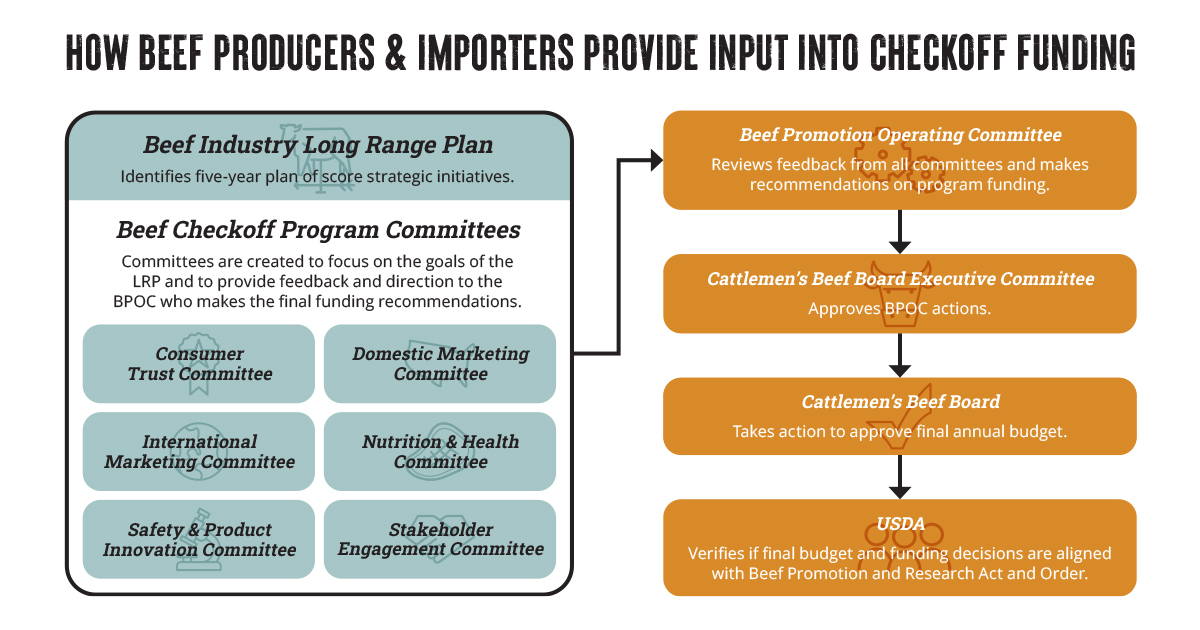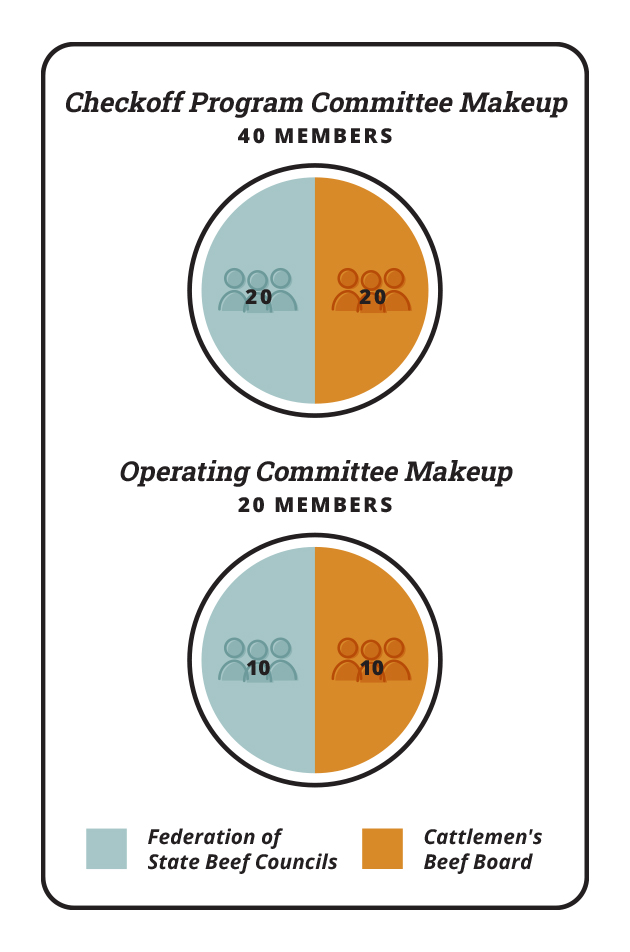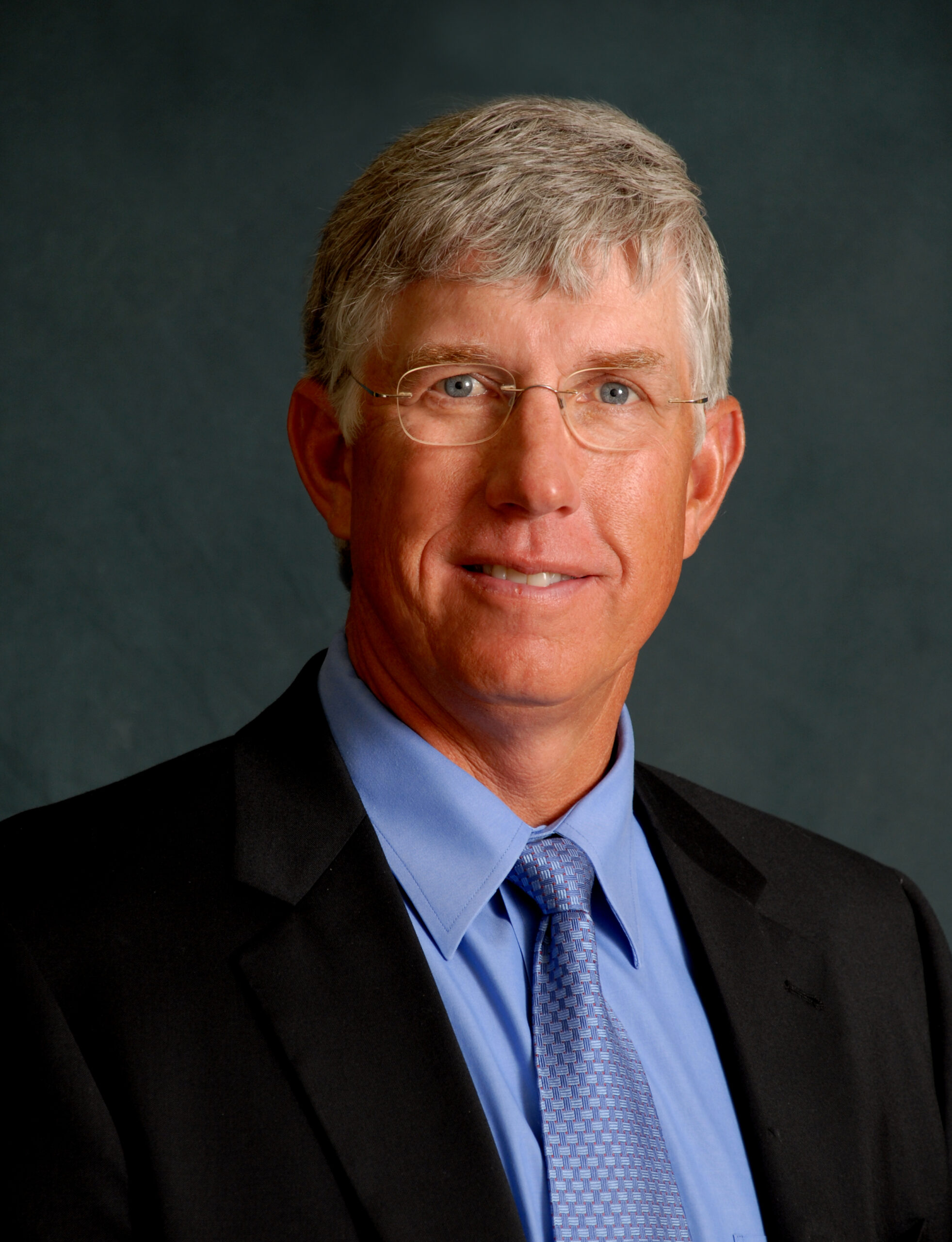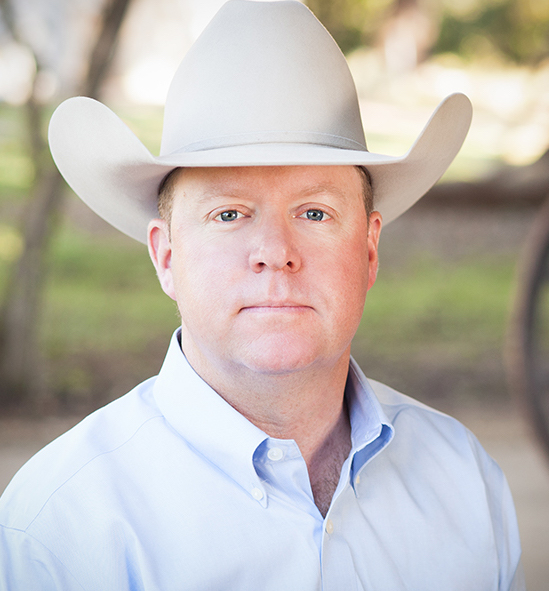DENVER, CO (Sept. 11, 2023) – The Cattlemen’s Beef Board (CBB) will invest approximately $38 million into programs of beef promotion, research, consumer information, industry information, foreign marketing, and producer communications during fiscal 2024, subject to USDA approval.
In action at the end of its September 6-7 meeting in Denver, Colorado, the Beef Promotion Operating Committee (BPOC) approved Checkoff funding for a total of 12 “Authorization Requests” – or grant proposals – for the fiscal year beginning October 1, 2023. The committee, which includes 10 producers and importers from the Cattlemen’s Beef Board and 10 producers from the Federation of State Beef Councils, also recommended full Cattlemen’s Beef Board approval of a budget amendment to reflect the split of funding between budget categories affected by their decisions.
Nine contractors and three subcontractors brought 15 Authorization Requests worth approximately $49 million to the BPOC this week, approximately $11 million more than the funds available from the CBB budget.
“We’re consistently impressed with the proposals that our contractors bring forward each year, and choosing which initiatives to fund is a real challenge,” said Jimmy Taylor, CBB and BPOC chair. “Our budget amounts to slightly less each year because of inflation. To put it in perspective, a dollar in 1985 is worth just 35 cents1 today. That means we simply don’t have the buying power that we had when this program first started.
“As we expected, the Authorization Requests we reviewed this week were full of new ideas and innovative approaches supporting the Checkoff’s core programs of research, promotion, foreign marketing, industry information, consumer information and producer communications. Our committee did a great job of balancing our budget and distributing our limited funds in what we believe is the most optimal way possible. I personally thank our contractors and committee members for all their hard work, and I look forward to future Checkoff successes throughout FY24.”
In the end, the BPOC approved proposals from eight national beef organizations for funding through the FY24 Cattlemen’s Beef Board budget, as follows:
- American Farm Bureau Foundation for Agriculture – $800,000
- Cattlemen’s Beef Board – $1,800,000
- Foundation for Meat and Poultry Research and Education – $500,000
- Meat Import Council of America / Northeast Beef Promotion Initiative – $900,000
- National Cattlemen’s Beef Association – $25,405,000
- National Institute for Animal Agriculture – $60,000
- North American Meat Institute – $330,000
- United States Meat Export Federation – $8,150,000
Broken out by budget component – as outlined by the Beef Promotion and Research Act of 1985 – the FY24 Plan of Work for the Cattlemen’s Beef Promotion and Research Board budget includes:
- $9,275,000 for promotion programs, including beef and veal campaigns focusing on beef’s nutritional value, eating experience, convenience, and production.
- $8,300,000 for research programs focusing on pre- and post-harvest beef safety, scientific affairs, nutrition, sustainability, product quality, culinary technical expertise, and consumer perceptions.
- $7,600,550 for consumer information programs, including Northeast influencer outreach and public relations initiatives; national consumer public relations, including nutrition-influencer relations and work with primary- and secondary-school curriculum directors nationwide to get accurate information about the beef industry into classrooms of today’s youth. Additional initiatives include outreach and engagement with food, culinary, nutrition and health thought leaders; media and public relations efforts; and supply chain engagement.
- $2,819,450 for industry information programs, including dissemination of accurate information about the beef industry to counter misinformation from other groups, as well as funding for Checkoff participation in the annual national industrywide symposium about antibiotic use. Additional efforts in this program area include beef advocacy training and issues/crisis management and response.
- $8,150,000 for foreign marketing and education, focusing on 13 regions, representing more than 90 countries around the world.
- $1,800,000 for producer communications, which includes investor outreach using national communications and direct communications to producers and importers about Checkoff results. Elements of this program include ongoing producer listening and analysis; industry collaboration and outreach; and continued development of a publishing strategy and platform and a state beef council content hub.
The full fiscal 2024 Cattlemen’s Beef Board budget is approximately $42 million. Separate from the Authorization Requests, other expenses funded include $270,000 for program evaluation; $640,500 for program development; $200,000 for Checkoff education resources; $550,000 for USDA oversight; $205,000 for state services; $270,000 supporting services and litigation; and $2.0 million for CBB administration. The fiscal 2024 program budget represents a decrease of slightly less than 1.6% percent, or $605,000, from the $38.6 million FY23 budget.
For more information about the Beef Checkoff and its programs, including promotion, research, foreign marketing, industry information, consumer information and safety, contact the Cattlemen’s Beef Board at 303-220-9890 or visit DrivingDemandForBeef.com.

 One of the essential components of the Beef Checkoff is the use of program committees, which consist of beef producers and importers who volunteer their time to the Cattlemen’s Beef Board and the Federation of State Beef Councils, helping guide Beef Checkoff initiatives. These members, who come from every sector of the beef industry – cow/calf, feeder, stocker, veal, dairy and imports – are responsible for identifying priorities, making recommendations and ultimately overseeing the investment of Beef Checkoff funds.
One of the essential components of the Beef Checkoff is the use of program committees, which consist of beef producers and importers who volunteer their time to the Cattlemen’s Beef Board and the Federation of State Beef Councils, helping guide Beef Checkoff initiatives. These members, who come from every sector of the beef industry – cow/calf, feeder, stocker, veal, dairy and imports – are responsible for identifying priorities, making recommendations and ultimately overseeing the investment of Beef Checkoff funds. The Beef Promotion Operating Committee has 20 members, 10 of whom are elected to serve by the Cattlemen’s Beef Board, while the states select the other 10 through the Federation of State Beef Councils. A program is only approved for funding if two-thirds of the members of the committee vote to accept it. This means a program must have recognized value to earn the consensus needed for funding.
The Beef Promotion Operating Committee has 20 members, 10 of whom are elected to serve by the Cattlemen’s Beef Board, while the states select the other 10 through the Federation of State Beef Councils. A program is only approved for funding if two-thirds of the members of the committee vote to accept it. This means a program must have recognized value to earn the consensus needed for funding.
 Vice Chair Andy Bishop and his wife Meagan are raising their four children on their registered Angus seed stock operation, Fairfield Farm, near Cox’s Creek, Kentucky. Bishop began his career teaching agriculture to students and eventually moved into the field of agriculture lending in 2007. Bishop is the former chair of the Kentucky Beef Council and the National Cattlemen’s Beef Association (NCBA) Young Cattlemen’s Conference. Bishop also served as a member of the Long Range Planning Task Force and as president of the National Cattlemen’s Beef Association (NCBA) Young Producers Council and the Kentucky Cattlemen’s Young Producers group.
Vice Chair Andy Bishop and his wife Meagan are raising their four children on their registered Angus seed stock operation, Fairfield Farm, near Cox’s Creek, Kentucky. Bishop began his career teaching agriculture to students and eventually moved into the field of agriculture lending in 2007. Bishop is the former chair of the Kentucky Beef Council and the National Cattlemen’s Beef Association (NCBA) Young Cattlemen’s Conference. Bishop also served as a member of the Long Range Planning Task Force and as president of the National Cattlemen’s Beef Association (NCBA) Young Producers Council and the Kentucky Cattlemen’s Young Producers group. Moorhouse grew up on his family ranch, a cow/calf and stocker operation in North Central Texas. After graduating from Texas A & M University, he went to work for Continental Grain Cattle Feeding (now Five Rivers). He is currently the general manager for Hartley Feeders, a Five Rivers Cattle Feeding operation. Moorhouse also operates his own stocker operation back home on part of the family ranch. Moorhouse and his wife, Colette, have two sons and reside in Amarillo, Texas.
Moorhouse grew up on his family ranch, a cow/calf and stocker operation in North Central Texas. After graduating from Texas A & M University, he went to work for Continental Grain Cattle Feeding (now Five Rivers). He is currently the general manager for Hartley Feeders, a Five Rivers Cattle Feeding operation. Moorhouse also operates his own stocker operation back home on part of the family ranch. Moorhouse and his wife, Colette, have two sons and reside in Amarillo, Texas. In honor of Veteran’s Day, the Cattlemen’s Beef Board would like to thank veterans for serving our country and helping to preserve our freedom. One hero we would like to recognize is Cattlemen’s Beef Board member Steve Hobbs from Great Falls, Montana. Steve joined the Navy in 1979 and served as a third-class petty officer. He began his journey working in the engine room of a destroyer ship and then trained as a Navy diver.
In honor of Veteran’s Day, the Cattlemen’s Beef Board would like to thank veterans for serving our country and helping to preserve our freedom. One hero we would like to recognize is Cattlemen’s Beef Board member Steve Hobbs from Great Falls, Montana. Steve joined the Navy in 1979 and served as a third-class petty officer. He began his journey working in the engine room of a destroyer ship and then trained as a Navy diver.